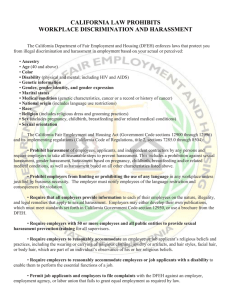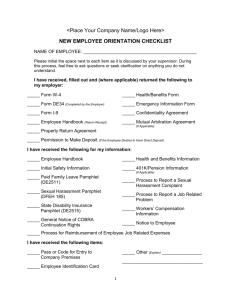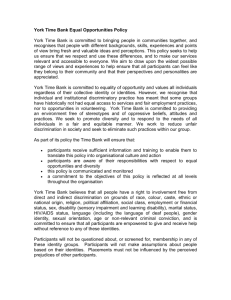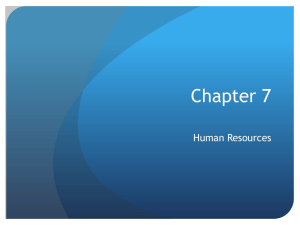Discrimination and Harassment in Employment are Prohibited by Law
advertisement
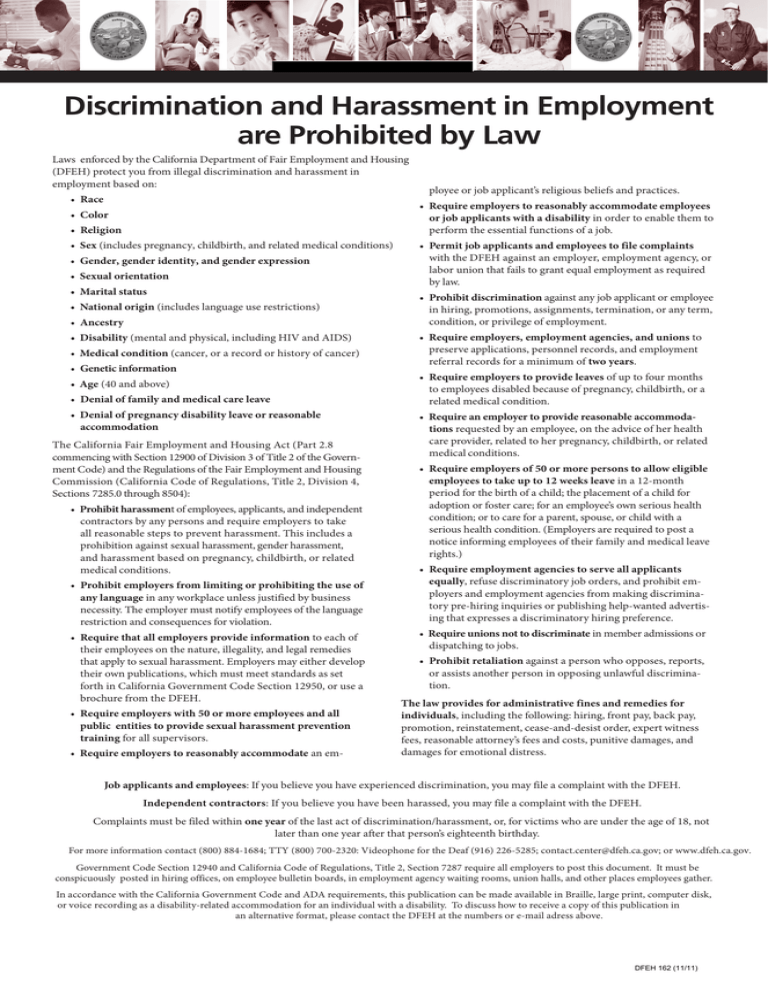
ing Discrimination and Harassment in Employment are Prohibited by Law Laws enforced by the California Department of Fair Employment and Housing (DFEH) protect you from illegal discrimination and harassment in employment based on: • Race ployee or job applicant’s religious beliefs and practices. • Require employers to reasonably accommodate employees or job applicants with a disability in order to enable them to perform the essential functions of a job. • Color • Religion • Sex (includes pregnancy, childbirth, and related medical conditions) • Gender, gender identity, and gender expression • Sexual orientation • Marital status • National origin (includes language use restrictions) • Ancestry • Disability (mental and physical, including HIV and AIDS) • Medical condition (cancer, or a record or history of cancer) • Genetic information • Age (40 and above) • Denial of family and medical care leave • Denial of pregnancy disability leave or reasonable accommodation The California Fair Employment and Housing Act (Part 2.8 commencing with Section 12900 of Division 3 of Title 2 of the Government Code) and the Regulations of the Fair Employment and Housing Commission (California Code of Regulations, Title 2, Division 4, Sections 7285.0 through 8504): • Prohibit harassment of employees, applicants, and independent contractors by any persons and require employers to take all reasonable steps to prevent harassment. This includes a prohibition against sexual harassment, gender harassment, and harassment based on pregnancy, childbirth, or related medical conditions. • Prohibit employers from limiting or prohibiting the use of any language in any workplace unless justified by business necessity. The employer must notify employees of the language restriction and consequences for violation. • Require that all employers provide information to each of their employees on the nature, illegality, and legal remedies that apply to sexual harassment. Employers may either develop their own publications, which must meet standards as set forth in California Government Code Section 12950, or use a brochure from the DFEH. • Require employers with 50 or more employees and all public entities to provide sexual harassment prevention training for all supervisors. • Require employers to reasonably accommodate an em- • Permit job applicants and employees to file complaints with the DFEH against an employer, employment agency, or labor union that fails to grant equal employment as required by law. • Prohibit discrimination against any job applicant or employee in hiring, promotions, assignments, termination, or any term, condition, or privilege of employment. • Require employers, employment agencies, and unions to preserve applications, personnel records, and employment referral records for a minimum of two years. • Require employers to provide leaves of up to four months to employees disabled because of pregnancy, childbirth, or a related medical condition. • Require an employer to provide reasonable accommodations requested by an employee, on the advice of her health care provider, related to her pregnancy, childbirth, or related medical conditions. • Require employers of 50 or more persons to allow eligible employees to take up to 12 weeks leave in a 12-month period for the birth of a child; the placement of a child for adoption or foster care; for an employee’s own serious health condition; or to care for a parent, spouse, or child with a serious health condition. (Employers are required to post a notice informing employees of their family and medical leave rights.) • Require employment agencies to serve all applicants equally, refuse discriminatory job orders, and prohibit employers and employment agencies from making discriminatory pre-hiring inquiries or publishing help-wanted advertising that expresses a discriminatory hiring preference. • Require unions not to discriminate in member admissions or dispatching to jobs. • Prohibit retaliation against a person who opposes, reports, or assists another person in opposing unlawful discrimination. The law provides for administrative fines and remedies for individuals, including the following: hiring, front pay, back pay, promotion, reinstatement, cease-and-desist order, expert witness fees, reasonable attorney’s fees and costs, punitive damages, and damages for emotional distress. Job applicants and employees: If you believe you have experienced discrimination, you may file a complaint with the DFEH. Independent contractors: If you believe you have been harassed, you may file a complaint with the DFEH. Complaints must be filed within one year of the last act of discrimination/harassment, or, for victims who are under the age of 18, not later than one year after that person’s eighteenth birthday. For more information contact (800) 884-1684; TTY (800) 700-2320: Videophone for the Deaf (916) 226-5285; contact.center@dfeh.ca.gov; or www.dfeh.ca.gov. Government Code Section 12940 and California Code of Regulations, Title 2, Section 7287 require all employers to post this document. It must be conspicuously posted in hiring offices, on employee bulletin boards, in employment agency waiting rooms, union halls, and other places employees gather. In accordance with the California Government Code and ADA requirements, this publication can be made available in Braille, large print, computer disk, or voice recording as a disability-related accommodation for an individual with a disability. To discuss how to receive a copy of this publication in an alternative format, please contact the DFEH at the numbers or e-mail adress above. DFEH 162 (11/11)(05/06) DFEH-162
